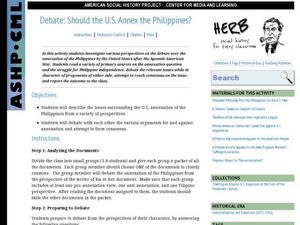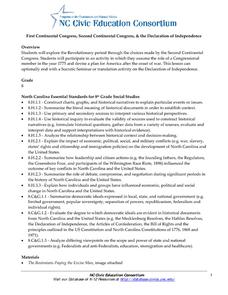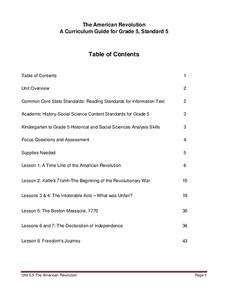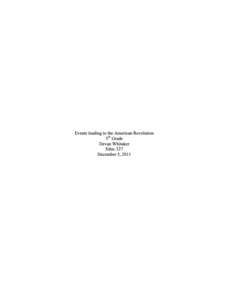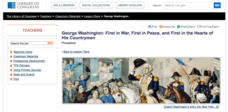Historical Thinking Matters
Spanish-American War: 5 Day Lesson
Nine historical documents, an interactive online notebook, and a fantastic opportunity for historical inquiry await your pupils in this 5-day lesson plan. Class members identify and discuss various causes for the Spanish-American War...
Curated OER
Debate: Should the U.S. Annex the Philippines?
Building an argument with supporting evidence is a vital skill. Learners engage in a debate over the annexation of the Philippines after the Spanish-American War. They take on the perspective of an individual from that time period,...
Friends of Fort McHenry
A Just War or Just a War?
What, if anything, makes a war "just"? This is an interesting and important question to explore with your class, and you can utilize an excellent lesson plan to support your group inquiry. The American Revolution and the War of 1812...
Curated OER
The War in the South, 1778-1781
Students explore the major terms of the Franco-American alliance and their importance to the cause of independence. The most important military engagements in the South are discussed and their significance for the outcome of the war noted.
Roy Rosenzweig Center for History and New Media
Patriots or Traitors - Point of View in the War for Independence
Patriots or traitors? Class members analyze images that present widely differing views of the Boston Tea Party, identifying the point of view of the image, the propaganda devices used, and the intended audience.
US House of Representatives
Hispanic Americans in Congress During the Age of U.S. Colonialism and Global Expansion, 1898–1945
To be Puerto Rican, in the words of one politician, is to be "foreign in a domestic sense." Young historians consider the American role in colonialism and its impacts on Hispanic Americans through the first part of the twentieth century...
Smithsonian Institution
Who's in Camp?
Pupils complete readings, a group activity using cards, and a writing activity to better understand people's lives during the American Revolution. The resource emphasizes people such as the militiamen, women, officers, and children,...
Los Angeles Unified School District
Why Is the Declaration of Independence Important?
Fair or unfair? To begin a study of the American Revolution, class members review the treatment of the people of the American Colonies by the King of England and decide which were fair and which were unfair. Class members then annotate a...
National Endowment for the Humanities
The War in the South, 1778–1781
The second in a three-part look at the Revolutionary War focuses the years from 1778 through 1781 and zooms in on military operations in the southern colonies, the French alliance, and the role African-Americans played in events. Class...
Curated OER
The War in the North, 1775-1778
Students investigate the hardships and difficulties that the Continental army faced in the early years of the American War for independence. the battles of Lexington and concord and the expectations of the Continental Army forms the...
University of California
The Vietnam War (1945 – 1975)
Have you ever wanted to do something so perfectly you wound up not doing it well at all? Young historians use primary and secondary documents to analyze the United States involvement in the Vietnam War. The issues surrounding the...
Carolina K-12
First Continental Congress, Second Continental Congress, and the Declaration of Independence
Your learners will take on the roles of Congressional members in the year 1775 and devise a plan for America after the onset of the Revolutionary War.
PBS
Journalism in War Time: What Does the Public Need to Know?
A viewing of the documentary War Feels Like War, launches an exploration of the importance of accurate and comprehensive war reporting. Groups investigate various news agencies and assess the factors that influence their stories. A...
Avi Writer
Sophia’s War: A Tale of the Revolution Teaching Guide
Sophia's War, Avi's novel that tracks the adventures of Sophia Calderwood, a fictional character, as well as the true stories of British Major John Andre and General Benedict Arnold during the American Revolution, is the anchor...
Northeast Georgia Regional Educational Service Agency
The American Revolution
An empowering lesson explores the causes and complaints that led to the American Revolution. Young scholars, starting in fourth grade, complete hands-on activities, role play, and create cartoons to understand the American Revolution and...
City University of New York
Women's Suffrage and World War I
Democracy cannot exist where not everyone has equal rights. Discuss the state of democracy and women's suffrage during World War I with class discussions, debates, and primary source analysis, in order for class members to connect...
Curated OER
Understanding American Values
Scholars read books and discuss emotions that lead up to the American Revolution. They also discuss vocabulary and use reference materials to research the Internet for causes and sentiment that led to the American Revolution.
California State University
The American Revolution
Invite your class on a ride through the American Revolution. Young historians travel through time as they explore the events that led to the foundation of the United States of America. Over the course of eight lessons, this unit...
Manchester University
Events leading to the American Revolution
The Stamp Act, Paul Revere's ride, and the Boston Tea Party pushed American colonists to the tipping point that led to the American Revolution. Fifth graders research the key figures of the war, study the Declaration of Independence, and...
Center for History Education
Guatemalan Coup of 1954: How Did the Cold War Influence American Foreign Policy Decisions?
Was it all about the bananas—or the fear of a communist threat? Young historians use a history lab to examine documents from the American-led 1954 Guatemalan coup. Using graphics, government documents, and speeches, they examine the...
Carolina K-12
On the Road to Revolution: Creating a Living Timeline
Divided into nine topic groups, from the Proclamation of 1763 to the Battles of Lexington and Concord, your young historians research significant events on the road to the American Revolution, then create a two- to three-minute sketch...
Library of Congress
George Washington: First in War, First in Peace, and First in the Hearts of His Countrymen
Does the lens of history portray George Washington as a good leader? A three-lesson unit looks at Washington's early military career as the commander of the Virginia Regiment, his role in the fight for independence...
Curated OER
America and Canada: The Post Cold War Era
Students discuss the provoking question, "What does the term social change mean?" They discuss the social changes taking place during and following the Cold War. Students participate in a short discussion, they are presented with facts...
Curated OER
Ending the War, 1783
Learners investigate how successful they were in obtaining their goals in the Revolutionary War. The peace feelers of 1775 are examined and the reasons for the British rejection of them explored. the main provisions of the Treaty of...

